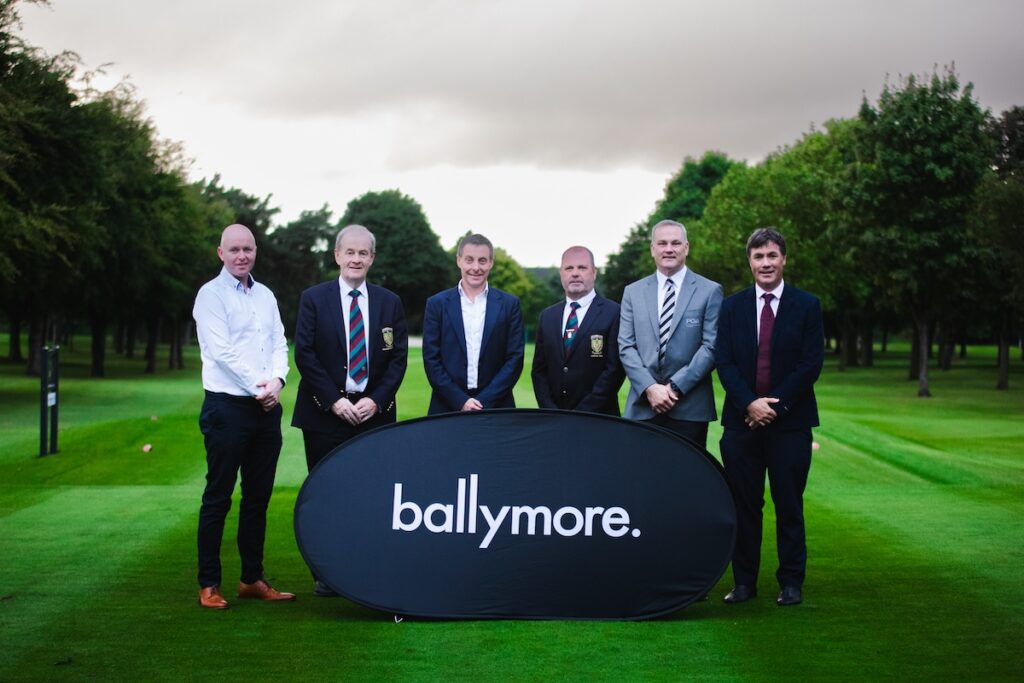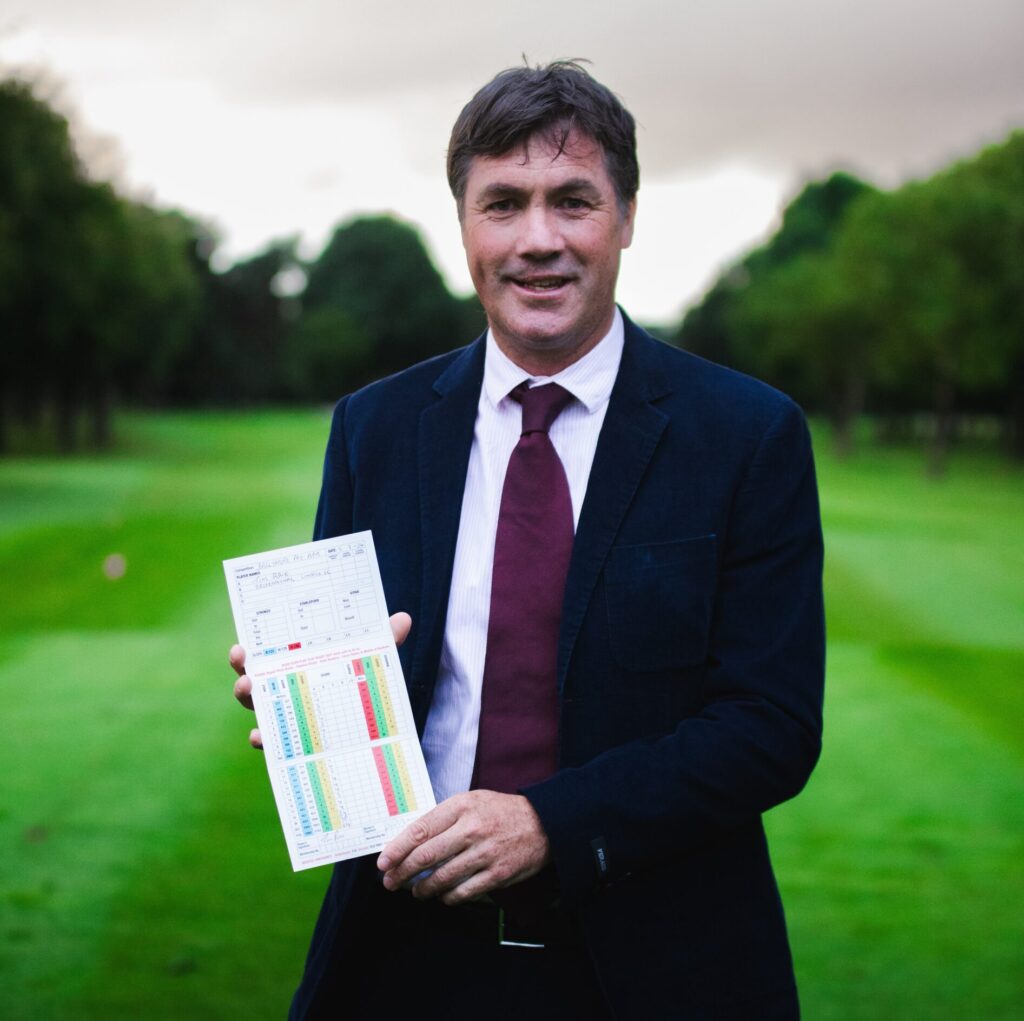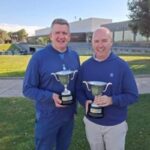Tim Rice wasn’t far beyond his seventh birthday when he found himself watching the 1984 Open Championship on television. A certain Spaniard called Severiano Ballesteros found himself tied for the lead playing the 72nd hole and left himself a 15-footer, breaking right-to-left. Though he didn’t know it, Tom Watson, with whom he was tied, was in the process of bogeying 17, so in Ballesteros’ mind it was a must make.
As Seve’s ball started its ascent, it looked for all the world like it was missing right, only for gravity to intervene at the last second and, deadweight, it dropped in the somewhere between the side and back doors. The crowd erupted, Seve was ecstatic, and he went above and beyond with his trademark fist pumping and infectious smile. And back in Limerick, seven-year-old Tim was smitten.
Watching Seve win, watching his reaction and seeing what it meant to him lit a fire inside the youngster and set him on a quest that’s 40 years running but with no end in sight.
“That had me hooked on golf, seeing that reaction, so I decided that that was going to be me. Initially the plan was to win the British Open, ideally at St. Andrews, so everything I’ve done in golf since has been an absolute disappointment since, and I’m running out of time here,” he jokes.
“But, as everyone knows about golf, it’s a continual disappointment so I’m grateful to be able to play such an amazing sport and to be so in love with it as well. A lot of people fall out of love with it, so I must be grateful for that. So, a year like this (where Rice has won the Elavon Order of Merit on the PGA in Ireland circuit) where you do come out on top at the end, you have to appreciate it.”
When he says continual disappointment, he says it tongue in cheek, because he’s talking about golfing perfection, something that deep down we all know is a pipe dream, but we’re never quite ready to admit. “Are you sure?” he deadpans, before breaking into laughter when it’s put to him that perfection doesn’t exist.
“I remember hearing something years ago when Bob Torrance was working with Pádraig Harrington – and it’s well known in sport – you strive for perfection knowing that you’ll never get there, and I’d have taken that to a serious degree.

“I mean spending hours in the living room holding a grip, trying to have the best grip in the world. And lads used to laugh at me in airports, because I’d have a grip with me going around on planes, just so I could hold something because I would feel like it was wasted time if I wasn’t working on my game on the aeroplane, you know.
“But that’s golf, it’s an addiction. I often say that it’s saved more marriages than anything else because I see guys on a wet Tuesday night in Spawell where I teach and they’re down there, banging their clubs off the ground and giving out to themselves, but that’s their addiction. If they didn’t have that, they could be out philandering or whatever, but instead, they’re down there working on their games, striving for betterment.”
And it’s that constant quest for improvement that means that Rice, at 47, is arguably playing better than he ever has and his results on the PGA Ireland circuit bear that out. In 27 tournaments, he’s got six victories (five solo, one shared) and only finished outside the top 10 on five occasions, and his consistently high level of performance was rewarded by winning the Elavon Order of Merit title for the first time.
And given the level of competition, that’s a serious achievement. Included in those six victories were two course records, the first coming at Newlands in July and the second following four weeks later at Bellewstown, and of the two, it was the latter that sticks out, not for the actual scores – both were seven-under rounds but Newlands was a 64 and Bellewstown a 65 – it was the manner in which he shot the 65.
‘Great rounds often start with a bogey’ is one of those old golfing clichés that are always dragged out when somebody does it, but when have you ever heard of a great round starting with a triple?
“It was funny,” he recalls, “it was a Pro-Am so you are playing with these three amateurs – they turned out to be great guys and one actually came for a lesson with me recently – so they’re expecting something when they’re playing with a pro and you start off with a triple bogey. I had to run back to the tee box like a madman after losing my ball, whack it down, hit it on the green and then three-putt for a ‘seven’ and you know they’re going ‘what the hell have we got here’.
“On the second tee, one of them said: ‘It’s gonna be a long day now, isn’t it’, and I’m thinking ‘yeah, it is!’ I’m wondering if I could feign an injury, say my hip is sore and go home because I’m already three-over, but then you stop giving a hoot and just decide you’re going to play the next 17 holes and try to enjoy the company. Then, because you stop giving a hoot, you just start hitting at every flag and start making birdies.”
And make birdies he did; 11 of them in the next 15 holes. It’s the kind of run that we all dream of, but only truly elite players ever actually go on, and his three amateur partners got to witness and be part of something extremely special.
“It was one of those rare days where you aim at the hole and it goes in,” he said. “It doesn’t happen very often. Maybe there’s a lesson there. Paul O’Connell told me that it’s a big phrase in Irish rugby at the moment, to ‘get out of your own way’.”
But that’s an easier said than done. Rugby is a reactionary sport; golf is anything but. And getting out of his own way is something that Rice and most other golfers struggle with in the constant and vain pursuit of perfection.
While a PGA Professional can make a decent side income on the PGA Ireland circuit, it’s not enough to allow for being a full-time player, but through Rice’s coaching sessions that he conducts at Spawell Golf Academy in Templeogue, Dublin and at Limerick Golf Club have actually had a positive impact on his own game as they’ve trained him to refocus on some of the basic tenets of the game that he’d gradually lost sight of.
“When I teach people now, I’m very strict because I’m a disciple of the Howard Bennett school of golf,” he explains. “He was Harrington’s first coach, and he preached this thing called ‘G.A.A.P.’ – grip, aim, alignment, posture – and he’d make you do it before every shot. You had to do it, and you got a feedback sheet at the end of the session and you’d be told that if you didn’t do it, he didn’t want you back. You have to have a process, and Howard gave us a really good one back when we were very young.”
“But I probably lost that over the years. Then, when I started teaching people, I realised that nobody has G.A.A.P., so you start teaching it too and telling people that this has to be part of your routine and your swing. Then I realised that, while everybody needs this or some form of it at least, I’d actually stopped doing it myself.
“I’m teaching something that I’m not actually doing myself, so I started doing that again and it actually made me a lot more consistent. So that’s why you see me now and I sometimes look like a madman over the ball because I’m trying to get that process right.”

Harrington’s is a name that comes up frequently in conversation with Rice, and that’s no coincidence. While Rice may not have had Harrington’s success on the global scene, and the Dubliner is six years Rice’s senior, they are very similar in many ways and sometimes it’s to their own detriment.
During his 11-birdie streak at Bellewstown, Rice wasn’t thinking about where it was safe to miss, he only had eyes for the flag. But that’s a tough mental state to get yourself into and, quite simply, you’re either a thinker or you’re not. And like Harrington, Rice is a thinker.
“I went to a man who was a very controversial teacher called Jimmy Ballard, and I think I should’ve stuck with him,” he recalls when asked what advice he would give to his younger self. “My dad asked me why I wouldn’t go over and live beside him in Florida, stay there, get a job over there and work, and he was 100% right.
“I didn’t do it. I came back to Ireland, and I was kind of left to my own devices and I really wish I’d stayed there. He had coached Seve, Sandy Lyle and Curtis Strange, and they all became world number one at one point, and he had a lot of great information to give. But when I got on my own, I started to do my own thing and this is advice for every golfer, if you’re going to get guided by someone, stay being guided by them if you believe in them.
“What I did was I decided to teach myself and I really went down a bad road. Then I went to other teachers and got different information, and then I’d go back to that, so really, looking back I should’ve stuck with him because when I went to him first, I came back and won events on the EuroPro Tour and was really going well.
“Then I decided to try to take [my game] on to another level on my own. I was so curious, I was reading every book on golf, you know, start going down every path. So, back then I probably wasn’t suited to being a proper golfer. If you want to study golf, be a golf teacher, so that’s where I’m at at the moment. But I love it, I love teaching. I really get a kick out of it.
“I’m fascinated by looking at someone and trying to figure out – both of you together – what’s going on here. It’s really enjoyable and I think I teach very simply. I played in a very complicated manner, but when I teach, I dare not go down the road of complication because I know what it did to me, so I think I’ve become a better teacher as I’ve gotten more experience, and I know where information overload can take you.”
When you hear Rice talk about the issues he faced with his own game, it’s easy to forget that he’s not just in the one percent, he’s a small percentage of the one percent, who was good enough as an amateur to be recruited by the University of Toledo in Ohio, and who played in European Tour events and made the cut.
And thanks to his consistent and unwavering work ethic, his willingness to travel and compete, and coming closer to accepting that perfection is never attainable, he’s helped take the PGA in Ireland regional circuit to a level rarely seen in the past.
But in typically modest fashion, he plays down his achievement in being the leading player on the circuit in 2024. “I’m lucky in the sense that, because I’m teaching, I’m able to go off and play maybe more so than other people,” he shrugged. “So if I see an event, I’m going there. And I love playing on the region because the level is so high now. There’s so many who have played – we’ve all at one time tried to make it – at a really high level, like Damien McGrane, David Higgins and Simon Thornton who all did very well on the [European] Tour, and some of the rest of us who maybe didn’t get quite that far, but we’re all so competitive and it’s great to have something like that in Ireland that we can look forward to.
“It’s almost like being a boy again. You’re going out trying to beat Walker Cup players, European Tour players, and players who’ve almost all played for Ireland at some point as amateurs, so it’s a very high level of golf actually. And, as Niall Kearney said, it’s only when you start playing it that you realise you’ve got to shoot seven-, eight-, maybe nine-under-par to win a Pro-Am, so it’s very good for all of us that we have to keep each other on our toes. And it’s great that we have the Elavon supported Order of Merit to measure up over the season.”

So, what’s the difference? He’s been a regular winner on the PGA in Ireland circuit, and, 2018 aside, has picked off at least one win every year since his crowning achievement in winning the 2017 Irish PGA Championship at Moyvalley. What’s he done differently in 2024 that’s promoted a six-victory haul and propelled him to the top of the Elavon Order of Merit?
Well, the competitor in him isn’t going to quite divulge, but he was willing to give a sneak peek. Maybe for the price of a lesson he’ll lay out the whole plan.
“I struck on something last May in a technical sense,” he said, “and it’s got to do with a kettle bell. I stayed with it for most of the season. It meant I was doing the same thing every week, the same drill every week, whereas normally I’d be changing and that helped me to be much more consistent.
“So, there’s a lesson there for every amateur,” he added, reverting to Tim Rice the coach once more. “Stick to one thing for one summer rather than chopping and changing every time you have a bad round.”
While he’s just about ready to concede that his dream of winning the Open Championship at St. Andrews might not come to fruition, there are another couple of goals which he has underlined in what he calls “more than an encyclopaedia” of golf notes, musings, and general tips that he’s accumulated down through the years.
One will come around when he turns 50 in three years’ time and become eligible to qualify for the Legends Tour. Another is to get to play in his first ever Irish Open.
The Legends Tour is a closed shop in many ways, designed as a sort of pension fund for once-regular European (DP World) Tour players, and there are only a few cards up for grabs each year at Q-School. Once upon a time, winning the PGA Ireland Order of Merit was more than enough to earn an Irish Open invite, but it’s becoming more of a closed shop as well and now, the only way for PGA Professionals to gain access is via winning the PGA Playoffs in Cyrpus as Thornton did earlier this year.
“That’s a huge incentive, because I’ve never played in an Irish Open,” he laments. “I won’t go into lingering detail but back when I was on the EuroPro and I was leading it (the Order of Merit), I was told I’d get an Irish Open invite but anyway, this was 20 years ago, and the spot got robbed. I was distraught because I was playing well and thought I might be able to do a Shane Lowry on it before Shane even did it and go and win it.
“Whatever about winning the British Open, I’d just love the honour of playing in the National Open.” Maybe he’ll get that chance, maybe he won’t. Maybe he’ll qualify for the Open Championship, maybe he won’t. Maybe he’ll be playing Legends Tour golf in a few years, maybe he won’t. One thing is certain: he’ll be playing golf somewhere and he’ll still be searching for ways to improve. For Tim Rice, golf is a drug. And he’ll be the first to admit that he’s a full-blown addict.
What they said about Tim’s Elavon Order of Merit win
Declan Lynch, CEO Elavon; “Elavon is delighted to sponsor the PGA Ireland Circuit, it’s great to see the level of support across the country at all the events including the Pro-Ams.
“Huge congratulations to Tim Rice for his fantastic win, showing such consistency over the season, resulting in him being crowned Order of Merit champion. The season has been a great success for many, both professional and amateur who turn out to play our amazing courses around the country.”
Tim Rice, Elavon Order of Merit winner; “It’s very pleasing. I found something in my swing at the start of the year and I stuck with it and that really helped me throughout the year. “The standard was so high this year. Colm Moriarty set the tone in the first event in Lucan when he shot seven-under, so everyone else had to get up to speed pretty quickly. You couldn’t make a couple of birdies and stop, you had to keep going and it made all of us lift up our games. “A special thanks to the team at Elavon. Their enthusiasm and support all season were incredible. As sportspeople, we need support like that, and we thrive on it and hopefully it can continue to grow in the coming years.”
Conor Dillon, PGA Ireland Regional Manager; “I’d like to thank Elavon for making this one of the most successful seasons in many years. We’ve had record participation from both professionals and amateurs all over the country, and we visited some of the top courses in the country which meant that players got to experience top-class playing conditions and increased exposure for all of the golf courses involved. “Tim was outstanding all season. His consistency was incredible, but the standard across the board was so high, and that’s great for the region and also great for the sponsors. “Elavon have been amazing supporters, and we’re absolutely delighted to have them on board.”
Below are links to listen to the full interview with Tim Rice as a podcast on your preferred podcast provider
























Leave a comment